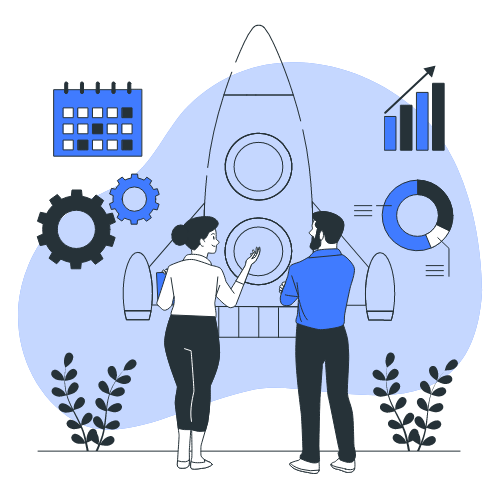Automate & Improve Efficiency: Adding AI to Your Digital Marketing
- Knowing AI and How It Affects Digital Marketing
Digital marketing is now dominated by artificial intelligence (AI), as more companies use this cutting-edge technology to optimize their operations. Starting off with AI can be scary, but maximizing its potential requires a better grasp of the technology.
AI is a branch of computer science that employs machine learning, data, and algorithms to build intelligent machines that can analyze, interpret, and act on data in ways that are comparable to or superior to those of humans. AI enables robots to learn from data sets and gradually improve their performance. This implies that they are capable of completing challenging jobs more quickly and precisely than people.
AI can be used to assist firms in developing better, more focused digital marketing strategies because it makes data analysis quicker and more efficient. AI can be used, for instance, to evaluate consumer data and find emerging market opportunities or common tendencies in customer behavior. Additionally, AI can be utilized to create customized messages and content for each consumer depending on their preferences and purchasing patterns. AI can also be used to automate repetitive processes like report generation, email answers, and copy editing.
The potential uses of AI in digital marketing will only expand as the technology develops. You may obtain a competitive edge in a world that is becoming more and more AI-driven by understanding AI and how to best integrate it into your digital marketing plan.
- An Overview of the Resources and Tools for AI Integration Currently Available
Artificial intelligence (AI) integration into your current digital marketing strategy has the power to completely change how you interact with clients and streamline your operations. Because of this, it’s crucial for organizations to comprehend the various resources and techniques available for integrating AI.
Depending on your unique objectives and spending limit, you can select from a range of platforms when it comes to AI. These include software development tools from companies like IBM Watson, Google AI, Microsoft Azure Machine Learning, Amazon Machine Learning, and more. Additionally, there are software programs like Narrative Science, Automated Insights, and MarketMuse designed expressly for personalizing and creating content. With the use of these services, you may create accurate automated messages, emails, and content pieces.
Understanding how AI integrates into your current digital marketing architecture is also crucial. The platform of many enterprise content management systems (ECMS) now includes AI-powered modules that let you automatically create pertinent content, track website performance, and learn crucial details about user behavior. Numerous third-party AI-integrated solutions are also available that can be linked to your ECM and utilized to automate, optimize, and personalize your digital marketing strategies.
Don’t forget to research the numerous AI-based virtual assistants and conversational AI technologies that are currently accessible. With the use of these technologies, chat bots and virtual customer support agents can be developed, and customer dialogues may be analyzed to gain a deeper understanding of customers’ wants and needs.
You can choose the best option for your company and make the most of AI’s potential in your digital marketing strategy by being familiar with all of the resources and tools available for AI integration.
- Creating a Digital Marketing Strategy Focused on AI
Utilizing artificial intelligence (AI) in digital marketing can be a potent instrument for helping organizations expand and succeed. Businesses may now customize client experiences in ways that were previously inconceivable, automate tasks, increase targeting efforts, and acquire deep insights into customer behavior and trends. But first, you need to develop an AI-focused strategy in order to start reaping the rewards of AI in digital marketing.
Careful preparation, investigation, and testing are necessary for an AI-focused digital marketing approach to be effective. Setting goals, comprehending consumer needs, and defining key performance indicators (KPIs) are fundamentals to building your plan. These will aid in ensuring that AI solutions are implemented in a manner that satisfies the goals and yields the desired outcomes. It’s crucial to include the most recent AI trends, developments, and innovations into your approach. This will enable you to benefit from cutting-edge technology and seize possibilities as they present themselves.
Once you have these fundamental components in place, you should think about how AI solutions might help you achieve your KPIs. AI solutions can be used to increase targeting efforts, track and improve consumer behavior analytics, develop automated personalized content, and leverage chatbots and AI-based messaging services for customer assistance, depending on the objectives of your digital marketing campaign. Last but not least, it’s crucial to make sure that any AI implementation adheres to best practices for lowering risk and protecting client data.
Businesses may make use of the newest technologies and realize the full potential of AI by carefully planning and executing an AI-focused digital marketing strategy.
- Using AI to Improve Targeting Efforts
Any effective digital marketing plan must include client targeting, and AI can facilitate these efforts. AI-powered technologies give organizations access to smart data that helps them better understand their target market and develop more efficient targeting plans.
Businesses can get extensive customer segmentation and real-time insights into consumer behavior patterns using AI-based analytics. This gives companies the ability to create customized communications that are more likely to connect with their target audience. Businesses can use AI-powered solutions to track customer sentiment by searching social media posts for particular keywords to learn how consumers feel about their products or brands.
Businesses can automate their targeting efforts with AI to increase their effectiveness and shorten the turnaround time. Businesses can define rules for user targeting based on certain characteristics using AI-powered platforms, enabling tailored marketing to run without human interaction. AI might be used, for instance, to send customers who exhibit a specific pattern of behavior—for instance, clicking on particular product pages or leaving a shopping cart—targeted ads.
Businesses can use AI to improve their targeting strategies and comprehend the ROI linked to them. AI-powered technologies can track the effectiveness of campaigns and determine which tactics work best. This makes it easier for firms to decide where to put more money in order to get the best return on their investment.
In conclusion, AI is a crucial tool for improving targeting efforts. AI is changing how companies target their clients, from offering helpful insights to optimizing campaigns for greater ROI. Businesses can maximize their targeting efforts and benefit from a fruitful digital marketing campaign by utilizing AI.
- AI-Powered Automated Personalization of Content
Artificial intelligence (AI) is currently playing a significant role in the creation of automated, tailored content for digital marketing. The creation and delivery of highly relevant content that is customized for each customer profile can be made simpler and faster by AI, which will increase customer engagement and happiness.
Marketers can use the data at their disposal to develop customer profiles that contain demographic data, likes, preferences, and more when automating the creation of personalized content with AI. The automated personalization of material for each user can then be done with the use of this data. Additionally, AI systems can assist in determining user intent, enabling advertisers to modify their content accordingly.
Using AI to develop content can increase accuracy and help with campaign targeting. AI can also aid in the creation of more complex material, such as films, photos, audio, and other interactive elements. AI can be used to automatically recommend modifications to ad placement or content based on user interactions, which can be used to track consumer behavior.
Marketers can decrease their human burden while maintaining accuracy and relevance to the target audience by employing AI capabilities to automate the generation of customized content. AI-powered content can also be used to expose customer insights, giving marketers useful input on how to strengthen their efforts.
But using AI to automate the creation of tailored content is not without difficulties. To create reliable consumer profiles, a large amount of data may be needed, and there is always a chance that client feedback will be interpreted incorrectly. However, marketers may produce highly tailored content that connects with their target consumers by carefully strategizing and using AI.
- Using AI-Based Messaging Services and Chatbots for Customer Support
Digital marketing initiatives may immediately provide customer assistance solutions through the use of AI-powered chatbots and messaging platforms. This technology has the ability to automate and streamline customer support requests, enabling companies to offer their clients a more effective service. Additionally, personalized experiences can be offered through the use of chatbots and AI-based messaging systems, increasing client engagement.
Computer programs called chatbots are made to respond to client encounters in a language that sounds natural, such as English or Spanish. They can assist with ordering procedures, respond to general inquiries, and offer information on goods and services. Personalized customer care can also be offered using AI-powered messaging platforms like Facebook Messenger, WhatsApp, and Skype.
It’s crucial to make sure that a chatbot or AI-based messaging system’s main function is to improve customer service rather than serve as a sales tool when setting one up. It must be configured to offer customers prompt, precise responses to their concerns. To offer a comprehensive customer service solution, chatbots and AI-based messaging systems need to be connected with traditional customer service platforms like email and telephone assistance.
It’s crucial to think about tracking client discussions and seeing behavioral trends with AI-powered customer service analytics. By using this information, customer service may be enhanced and patron loyalty can rise. AI-based technology can also be used to accurately target content by detecting customer sentiment.
Digital marketers can provide quick, effective, and personalized customer care by using AI-based chatbots and messaging platforms. This technology can be a priceless tool for any digital marketing campaign when applied properly.
- Tracking and enhancing consumer behavior analytics with AI
Digital marketers can have a better understanding of their target market by being able to track client activity. Artificial intelligence (AI) can offer significant insights into consumer behavior, enabling companies to develop more successful marketing efforts. Digital marketers may better understand customer buying patterns, preferences, and interests with AI-driven data, as well as how customers engage with their goods and services.
Digital marketers can find potential ways to connect with their target audience by using AI-driven data. AI-driven analytics can offer insight into customers’ browsing behaviors and the websites where they are most likely to make purchases by analyzing data like website visits, page views, and time spent on a website. Additionally, AI-driven analytics can identify client segments that are more likely to carry out particular behaviors, like downloading an app or subscribing to a newsletter.
Digital marketers may predict customer behavior by using predictive models based on AI-driven statistics. Digital marketers may create more educated campaign plans and more precise customer targeting by using predictive models to predict future trends and consumer spending. Predictive models can also assist digital marketers in foreseeing client wants and creating tailored content that appeals to their target market.
Analytics powered by AI can also be utilized to learn important information about customer sentiment. AI-driven analytics can assist digital marketers in identifying trends in customer sentiment regarding their goods and services by monitoring customer reviews and comments. This data can be utilized to understand customer satisfaction and create strategies for resolving complaints from customers.
Digital marketers can obtain important insights into consumer behavior and design more effective ads by utilizing AI-driven analytics. Digital marketers may better understand consumer behavior, glean insightful information about consumer sentiment, and create predictive models to foresee future consumer requirements with the use of AI-driven analytics.
- Increasing Efficiency with AI and Automation
Utilizing the resources at our disposal to their fullest extent is crucial for digital marketers. Automation and the help provided by artificial intelligence (AI) present a novel technique to increase effectiveness and produce better results. Data analysis, targeting, and campaign management can all be done more quickly and precisely thanks to AI technology.
Automation of processes like managing customer outreach and gathering customer data is possible with AI. In order to better personalize their efforts for greater click-through rates and conversion rates, marketers can also utilize it to forecast consumer patterns and behavior. Even in the development of more successful marketing techniques, AI can be utilized to spot trends in consumer purchasing patterns.
Lead generation can also be automated using AI. AI can assist marketers in better targeting potential customers and generating higher-quality leads by analyzing customer data. AI can also be used to automate tasks like sending out automated marketing emails or responding to customer inquiries.
AI can assist marketers in finding opportunities for expansion. AI can find hidden patterns in data analysis that point to prospective growth areas. AI can identify areas that need improvement and make recommendations for how to improve campaigns and raise ROI.
AI automation and support can help marketers get greater results while saving time and money. To increase productivity and effectiveness, it’s critical for digital marketers to take AI into account.
- Protect Against Malware Powered by AI to boost security
Cybersecurity and virus protection are crucial in the digital age to secure your data, clients, and business operations. Thankfully, artificial intelligence (AI) may be employed to aid in defense against a variety of threats and potential intrusions. The potential of AI-powered malware prevention to identify suspicious activity before it becomes a problem is making it more and more popular.
Machine learning is used to create an analytics engine that can swiftly recognize malware signatures and patterns in order for AI malware defense to function. This enables the system to immediately identify problems and take corrective action before they become serious ones. The AI system, for instance, is able to recognize incoming bad emails and block them before they reach their intended recipient. Additionally, it can keep an eye on website traffic for any indications of questionable activity and notify the proper personnel if anything seems off.
A computer network or system may be harmed by malware such as trojan horses, ransomware, spyware, and other dangers. Other AI malware prevention solutions are built to actively monitor for these threats. These systems review enormous amounts of data that would otherwise take too much time to review manually using deep learning techniques. These AI-powered devices can recognize and thwart threats before they cause any real harm by swiftly processing the data.
The nicest thing about AI-powered malware prevention is that it may change over time to respond to new threats. The system may take note of new dangers as they materialize and revise its security protocols as necessary. This guarantees that systems are safe and shielded from the most recent dangers.
AI-based malware protection can assist in defending against dangerous software as well as safeguarding consumer information, intellectual property, and financial records. These systems can recognize suspicious activity before it develops into a problem and notify the required personnel by utilizing machine learning algorithms.
Investing in an AI-powered malware prevention solution is a terrific way to strengthen your cybersecurity efforts and protect your digital assets. You can ensure the security of your operations, clients, and data by putting the proper system in place.
- Examining Possibilities to Use AI in New Ways
It’s time to investigate the potential for utilizing artificial intelligence (AI) in novel and creative ways now that you have a better knowledge of how AI may be used in digital marketing. As an ever-evolving technology, AI offers countless potential applications. A few key applications of AI in digital marketing include:
AI-enhanced expansion of current marketing techniques
constructing completely new strategies based on client data
Using platforms powered by AI for consumer experiences
incorporating AI into user experience and web design
It’s vital to keep in mind the concept of “”augmenting humans with machines”” rather than completely replacing them while looking for new ways to use AI in digital marketing. Instead of attempting to replace human labor, AI should always be utilized to support and improve it.
Think about how artificial intelligence (AI) can be utilized to support human creativity and intuition, for instance, while creating a new marketing plan. AI can assist in seeing patterns in customer data and provide insights that aren’t always clear to a human. Additionally, it can automate routine operations so that staff members can concentrate their efforts on coming up with innovative ideas for engaging customers.
An intriguing potential for employing AI in ways that benefit both businesses and customers is to integrate it into web design and user experience. For instance, AI-powered chatbots might be employed to assist customers in swiftly and conveniently locating the goods or services they require. AI can also be used to modify page layouts and content to give each visitor a more customized experience.
Finally, businesses may employ AI-driven platforms to create a more thorough understanding of customer journeys, which will enable them to better target their marketing campaigns and, eventually, increase their bottom lines. AI can offer insightful data on consumer behavior that can be used to guide decisions on the best marketing channels, message content, and customer journey layout.
By keeping these pointers in mind, organizations can make the most of the enormous potential of AI in digital marketing and create plans that will result in substantive outcomes.
- Best Practices for Digital Marketing: AI Adoption and Risk Reduction
Despite the many advantages of using AI in digital marketing, precautions must be taken to reduce any potential hazards. Before implementing AI initiatives, it is important to examine the impact of AI on business budgets and consumer privacy. The following best practices will help you implement AI in your digital marketing strategy while minimizing risk:
Exercise due diligence: Any AI-based service provider should be thoroughly vetted before being hired. Check out their technological capabilities and go over their standards, rules, and client feedback.
Implement privacy policies: There should be explicit privacy protocols in place for all AI-based activities. Create security measures to secure client data, especially when it comes to sensitive personal data.
Set Limits: Artificial intelligence (AI) has the ability to automate operations more than is necessary. Establish realistic restrictions on the usage of AI in terms of resources, knowledge, and utility.
Monitor Performance: In order to maintain a consistent level of performance, machine learning algorithms need to be closely monitored and updated on a regular basis. Keep an eye on the findings, and be ready to tweak the algorithms as necessary.
Plan for Scale: To keep up with market developments, organizations may need to scale up their employment of AI or introduce additional AI tools as the technology develops. Make sure to account for available resources as well as any potential difficulties.
You may minimize risk and maximize the use of AI in digital marketing with the aid of these best practices. You can make sure that your AI-based projects are successful by carrying out due diligence, creating privacy standards, setting boundaries, monitoring performance, and preparing for scale.
- Utilizing AI’s Potential for Digital Marketing in Conclusion
The field of digital marketing could undergo a transformation because of artificial intelligence (AI). Businesses may use AI-driven technology to improve the effectiveness of their marketing, acquire deeper insights into customer behavior, and improve customer experiences if they have the necessary tools and resources. Marketing professionals should develop an AI-focused strategy, choose specific use cases, and adhere strictly to accepted best practices if they want to get the most out of AI in digital marketing.
Marketers can create digital campaigns that are more effective and tailored, analyze consumer behavior more precisely, and automate repetitive operations to increase productivity by utilizing AI tools and services. A key component of differentiating oneself from the competition and succeeding in the digital era is making use of AI’s capabilities. By spending the effort to establish an AI-driven digital marketing plan, you can fully utilize AI to further your company’s objectives and promote expansion.
FAQs regarding innovative applications and best practices for harnessing the potential of AI in digital marketing
How does artificial intelligence (AI) fit into digital marketing?
Artificial intelligence (AI) is a branch of computing that uses data, algorithms, and machine learning to give machines the ability to carry out difficult tasks. Its function in digital marketing is to improve access to data-driven insights that can help with targeting and segmentation and produce more individualized products and services.
- What kinds of resources and technologies are available for incorporating AI in digital marketing?
A number of materials and technologies are available for using AI in digital marketing initiatives. These consist of chatbot systems, automated segmentation and targeting tools, predictive analytics, natural language processing (NLP) solutions powered by AI, and more.
- How can I create a digital marketing plan that focuses on AI?
It’s crucial to start by comprehending the needs and objectives of the firm in order to design an AI-based digital marketing plan. The next step is to start looking for possibilities to integrate AI technologies into your current tactics. Examples include automating segmentation and targeting, personalizing content, and expediting customer service.
- How can I utilize AI to make my targeted efforts more effective?
A: By offering more precise segmentation and targeting based on data-driven insights, AI technology can be leveraged to enhance targeting efforts. This might entail using AI-powered demographic analysis to target campaigns to particular demographic groups, using AI-powered predictive analytics to choose the best timing and frequency for campaigns, or using AI-powered natural language processing to comprehend consumer purchasing trends and behavior.
5Q: Using AI, how can I automate the creation of tailored content?
AI-based natural language processing (NLP) solutions can be used to create automated personalized content by utilizing customer data to create highly targeted content based on consumer preferences, interests, searching activities, and other characteristics. AI can also be used to create more appealing images for increased engagement, as well as to change website page layouts and content based on user interests.
How can I track and enhance customer behavior analytics using AI?
AI-powered analytics can offer information on consumer behavior and preferences, which can be used to guide choices about the success of marketing initiatives as well as the segmentation and targeting of brand-new campaigns. AI can also be used to create predictive models that can be used to predict customer requests and modify content accordingly.
What are the best methods for lowering risk and implementing digital marketing based on AI? It’s crucial to check that data is maintained safely and that the appropriate privacy and security policies are in place before implementing AI-based digital marketing. Businesses also need to keep up with AI regulations, analyze performance metrics, and routinely audit implementations to identify any risks or problems.
Author Profile
- Nitin JainArticles by Nitin Jain
- Nitin Jain is the founder and C.E.O of India PR Distribution - India's top Press Release Distribution and PR Agency. Nitin has more than 20 years of experience in PR, Corporate Communications, Digital Marketing, Branding Strategy and Lead generation.
Latest entries
 Press Release TipsAugust 2, 2023How to Upcycle Content: Creative Ways To Get More Value From your content in 2023
Press Release TipsAugust 2, 2023How to Upcycle Content: Creative Ways To Get More Value From your content in 2023 Digital MarketingAugust 2, 2023Unlock Your Content Potential: A Guide to Repurposing
Digital MarketingAugust 2, 2023Unlock Your Content Potential: A Guide to Repurposing Press releaseAugust 2, 2023Unlock the Benefits of Repurposing: What is Content Repurposing & Does It Work?
Press releaseAugust 2, 2023Unlock the Benefits of Repurposing: What is Content Repurposing & Does It Work? Search OptimizationAugust 2, 2023Leverage Voice Search For Local Biz Success: Tips & Strategies
Search OptimizationAugust 2, 2023Leverage Voice Search For Local Biz Success: Tips & Strategies

